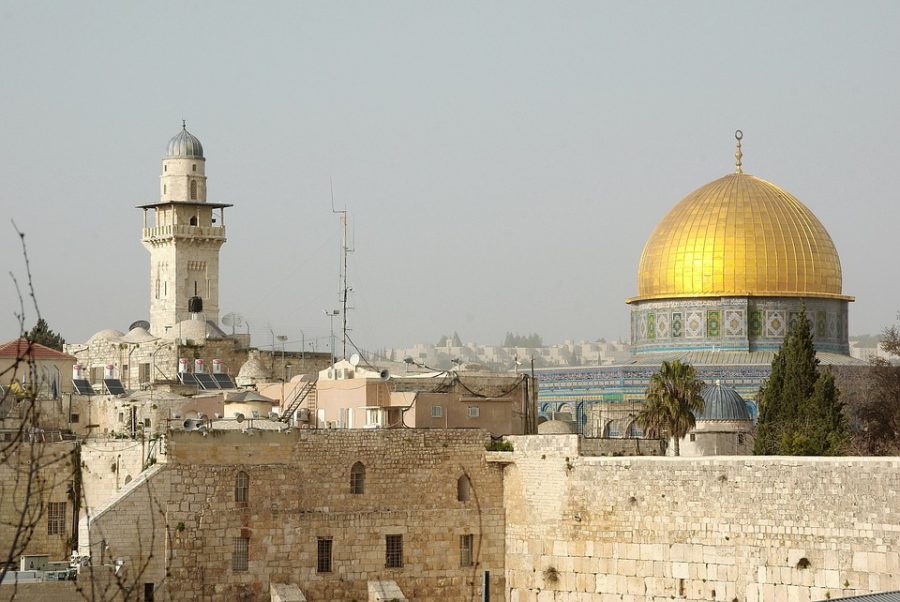Swanson: Israel’s Unspoken Complicity in the Israel-Palestine Conflict
September 23, 2019
On September 13, 1993, Yitzhak Rabin and Yasser Arafat shook hands before the world, juxtaposed between a grinning President Clinton. It wasn’t an all encompassing agreement that brought the two adversarial nations together. However, it was a monumental step in the direction of deescalation and building a peaceful future. These agreements were called the Oslo Accords.
In the Oslo Accords, Israel agreed to recognize a Palestinian government, and in turn that new Palestinian government would recognize Israel. Israel would withdraw their forces from the West Bank and the Gaza Strip, and the Palestinians would cease their violent protests. Five years later, the parties would reconvene to discuss the Israeli settlement of the West Bank, Palestinian right to return, border disputes and the fate of Jerusalem. After decades of consistent and bloody conflict, it finally seemed that the nightmare was coming to an end.
Today in 2019, the chance for peace between the Israelis and Palestinians seems miles away from where they were 26 years ago.
A lot has gone downhill since that September in 1993. Not all Palestinians and Israelis were satisfied with agreements in Oslo, and that discontentment would come to fruition in November of 1993, when Prime Minister Rabin was assassinated by a far-right Israeli radical. The peace process would never recover. Oslo II was signed in 1995, establishing areas of influence in the West Bank, divvying powers and responsibilities to Israel and the Palestinian Authority. Oslo II ultimately accomplished nothing more than that.
President Clinton made one last attempt at a diplomatic solution in the Camp David 2000 Accords. Prime Minister Ehud Barak reportedly offered most of the West Bank, Gaza and monetary compensation for the right of return in exchange for Israeli settlements in the West Bank and an end to militant aggression. Arafat declined the proposal and did not submit a counteroffer. Camp David 2000 ended its all-or-nothing negotiations with all of nothing. The cost of failure has been thousands of lives and counting.
It causes the observer to wonder how the prospect for peace has come so close, only to be irreparably torn apart again and again decades following such momentous talks — a lot of pomp and circumstance for much ado about nothing. UN resolutions and Nobel Peace Prizes manifested in an occupation in the West Bank and siege of the Gaza Strip. This has been the new normal for years now, since escalations between the Israeli state and the democratically elected representative of Gaza, Hamas, skyrocketed in 2014. Denizens of Israel can look up to record videos with their iPhones of the Iron Dome defense system intercepting another missile launched from Gaza, and a few days later the press will publish photographs of the devastation and carnage of another Israeli strike in the western Palestinian settlement. How can diplomacy ever be achieved when both parties seem so eager to resort to aggression?
Well, that is the question isn’t it? Let us examine all three parties of this conflict.
Palestine, Hamas and Israel

To the east is the West Bank — run by the Palestinian National Authority. It is the organization that met with Israel at the table in both Oslos and at Camp David and is recognized as a non-member state by the United Nations. Tensions have been relatively cool here — aside from the Intifadas — since the late ’60s, so much so that when Israel seized control of the West Bank and Gaza in the Six-Day War, citizens of Israel began to move into the hills of ancient Judea and Samaria to establish settlements of their own. Despite the agreement to Israeli sections of the West Bank in Oslo II, the Authority maintains the position that Palestinians have the right to self determination and that efforts should be maintained towards a two-state solution. However, with the ever growing influx of Israeli influence and occupation in the territory, the two-state solution seems less and less viable.
To the west is the Gaza Strip, run by the militant organization known as Hamas, elected into power in 2006, de-unifying Palestine. They believe in a one-state solution that results in the dissolution of Israel and a return to a unified Palestine, like the one that existed before 1948. The constant conflict between Hamas and Israel is responsible for the crux of violence and death since the Second Intifada. Hamas is condemned by the international community at large for their commitment to provocation and aggression against Israel. They remain a major obstacle that prevents viable negotiations for a two-state solution, or any solution at all.
It’s easy to look at Gaza and to pin the blame on Hamas for why tensions are so high in the region. However, we must look at Israel and their overt guilt in this matter. When newly elected representative of Minnesota’s 5th congressional district Ilhan Omar publicly criticized American politicians’ blind loyalty to Israel and their handling of the calamity that is the Israel-Palestine conflict, the world was set alight. It is interesting that so many “America Firsters” are so keen to defend Israel.
Israel’s Role in the Conflict

If you’re like me, growing up you’ve heard mostly positive talk regarding Israel from American politicians. The phrase “our strongest ally in the Middle East” comes to mind. In 2019, however, Beto O’Rourke is calling Prime Minister Netanyahu a racist, commentators on CNN and MSNBC are openly criticizing Israel, and Israel has even gone so far as to ban House representatives Omar and Rashida Tlaib for their remarks regarding the state. It makes you wonder, is Israel the bad actor?
You see, the Israel-Palestine conflict is not as black and white as “Hamas is the reason why nothing is being done regarding peace.” When we begin to hold Israel under the lens of scrutiny, the complications of the situation rear their faces. The State of Israel is not the same one that Rabin lead in ’93, and Netanyahu’s Knesset (the legislative body of Israel, think of it like the UK’s parliament) is not interested in peace.
Much ground was gained in the first Oslo talks because both parties were willing to compromise and take that next step closer towards a solution. Camp David 2000 and the bloodshed that has followed it is a testament to what the future holds when two parties with border disputes aren’t willing to meet each other in the middle — think Pakistan and India now.
Netanyahu has essentially advocated for a one-state solution where Israel remains the landlords of the whole region. It should’ve been clear to most when he vowed to annex the West Bank if re-elected as Prime Minister this year. While he is definitely not shy about his lack of respect towards Palestine, it should be noted that, much like Trump, he is not the problem, but a symptom. In fact, Israel had violated more United Nations Security Council resolutions than any other country, by far.
The Likud party has held a pretty firm grasp on Israel’s politics since 2001. Since then, a wall has gone up around the West Bank. The Palestinian government split. Israeli settlements have increased with promotion and funding from the government in the West Bank, along with the return of military presence. And Gaza has been illegally bulldozed to the point where it would take decades to rebuild it to where it was prior to 2014. It should be clear to everyone that this is not a path to peaceful resolution — it is the path towards Israeli domination over Palestine.
It should also go without say that this is a critique of Israel as a government and as a liberal democracy, rather than some antisemitic rhetoric like Donald Trump and the Republican party likes to paint it as. If the roles had been reversed and the Palestinians were asserting dominance over a geographically split Jewish state, international intervention would be openly discussed, and the situation would be seen as the human rights and legal catastrophe that it actually is. A state that segregates its people, allows free movement for some and forces others through checkpoints, denies citizenship and access to the ballot box to residents who will be affected by that government’s policies, turns a blind eye to illegal settlements in a territory by some citizens and patrols the streets of established towns and villages with armed soldiers is a far cry from what we would call democracy. Israel is far more like apartheid South Africa than Sweden.
Israel’s Iron Dome defense system has an effectiveness rating of 90%, and shoots down the vast majority of missiles fired from the Gaza Strip. Every time Israel retaliates, people die — many of them innocent civilians. If Israel is committed to peace, they would seize their onslaught against the people of Gaza. With every successful strike, anti-Israel sentiments grow and with that, so does the influence and prospects of Hamas.
The Need for Peace Talks

As Americans, we would be appalled by any other nation committing such flagrant atrocities against people within their own borders, let alone a modernized nuclear power. Crying out against Israel’s authoritarian tendencies is not some perverted form of antisemitism, it is demanding that an ally nation we closely affiliate with be held to a higher standard, one that shouldn’t be confused for tyranny. Antisemitism is a contradictory and absurd notion anyways, considering that Arabs are also Semitic. Accusations of antisemitism are a shield against criticism. Anti-Islamic rhetoric by Fox News and other mainstream outlets is rampant and pervasive compared to the rare one-off criticism of Israel or Jews, which is considered taboo in America.
The Israel-Palestine conflict is incredibly complicated. If it were easy to resolve it would have been remedied in the ’90s. In order for the bloodshed to come to an end on both sides of the wall, all parties must be able to come together to recognize and validate each others’ existence as different people with different experiences and histories who can coexist in the same area. I think of the Good Friday Accords in Ireland, where nationalist Catholics and unionist Protestants could agree to put down their arms for the sake of a peaceful future for their island. In an ideal world, I would like to see a two state solution in Israel and Palestine with Green Line soft borders, or perhaps a unified Israel-Palestine with those soft borders, like Czechoslovakia or Austria-Hungary.
But for now, those prospects only exist in an ideal world. The current system cannot change until rhetoric is changed and peace talks are started once again — oh, and when the bulldozing and razing of Palestinian territory stops once and for all.









Beer baron • Sep 30, 2019 at 12:54 am
It would be difficult to find anything remotely accurate in this unintentionally-hilarious, Orwellian-rewriting of history masquerading as an anti-Israel editorial, but I will restrict myself to the following point:
The myth of Arab Muslim victimhood is cheap propaganda stemming from the failed Arab attempts to destroy Israel and throw its Jewish population “into the sea.”
The anti-Israel left continues to pander to the bigoted, irrational demands of the Arab nations to suppress the region’s only non-Muslim country in favor of yet another Arab Muslim nation.
That blatant disregard for the rights of anyone who is not an Arab Muslim is precisely the reason why the Jews of Israel had to fight for their national independence.
The mere existence of Israel proclaims the national rights of the Jewish INDIGENOUS population of Israel; a country and a people that predate Arab colonialism and will outlive it as well.